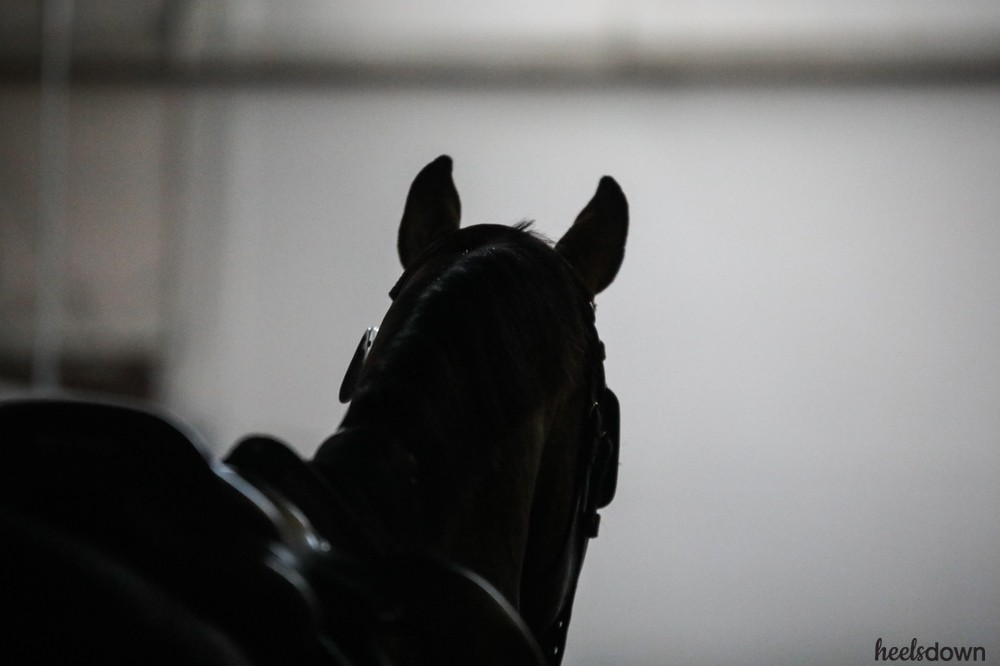Chinese Medicine Worked For My Horse When Traditional Medicine Failed

By the end of the summer, I was at my wits end.
My horse had lost weight. He’d pant all day in the back of his stall, even with two fans pointed at him, and after being hosed down a couple of times a day. My Thoroughbred had stopped sweating, and it felt like no matter what I did to try to help him – from vet visits to a slew of supplements and other treatments – nothing gave him any relief.
That is, until I tried Chinese medicine.
Anhidrosis is defined as a decreased or inability to sweat, which most commonly manifests in hot and humid climates like Florida and other Gulf Coast states, according to Dr. Martha Mallicote, a veterinarian with the University of Florida’s College of Veterinary Medicine in Gainesville, Fla. It’s a problem that plagues performance horses because thermoregulation, or the ability to regulate the body’s temperature, is so dependent on sweating.
I tried just about any remedy you can think of to help my horse. I talked to a half-dozen vets about his condition, seeking advice and affirmation that was I was doing everything that I could to help. But nothing was working.
Like This Story? Try: My Horse Stopped Sweating. Now What?
I’m a journalist by trade, and as such, I tend to make most of my decisions, especially with my horse, based on evidence and facts. When traditional medicine and supplements with proven results through medical studies wasn’t doing the trick, I turned to a renown vet in our area who treats horses from a natural and holistic approach. I was skeptical. But even my everyday vet recommended her, during one of the lowest points of my gelding’s suffering that summer. He said it was my best shot of getting my horse on the mend.
So I decided to give it a try.
Chinese medicine is a collection of various therapies, from herbal treatments to acupuncture, massage, exercise and dietary therapy. It’s based on holistic practices that have been used for more than 2,500 years. In today’s age, there are several DVMs that incorporate some Chinese medicine methods into their more traditional veterinary practices, often as complementary treatments to the usual Western protocols.
After one round of acupuncture, this holistic vet (who is a traditional DVM with certifications in acupuncture, chiropractic and homeopathy) was able to get my horse sweating again. But his treatment didn’t stop there – she identified a few other underlying issues we think contributed to his condition.
Read This Next: Am I Over-Supplementing My Horse?
This vet took time to chart out my horse’s nutrition with me, and made suggestions she thought would aid him in the long run. In addition, she “prescribed” several Chinese herbs, one for his lungs as a breathing aid, and another specifically to treat the non-sweating, which we served daily as a top dressing in his feed.
Once we were able to get him sweating again, I was able to maintain his condition through the rest of the summer with these new treatments in place. He didn’t huff away in his stall anymore with that exhausted, glazed-over look in his eye. He didn’t need the two fans running in front of his stall either.
My horse’s whole routine changed as a result. We are more mindful of what we’re putting into his body now, and what kind of “output”, or effect, it could have on his overall health. And our protocol began with a two-week detox.
I never thought I would make such a turn in my thought process to treating my horse. I don’t buy in to the natural organics or essential oil therapy you can get in the health foods store, but it’s hard to turn the other way when it’s the first thing I’ve seen make a noticeable difference in the behavior and overall health of my horse. Anecdotally of course, but I can’t deny that these tiny needles and a handful of herbs isn’t helping my friend feel better.


